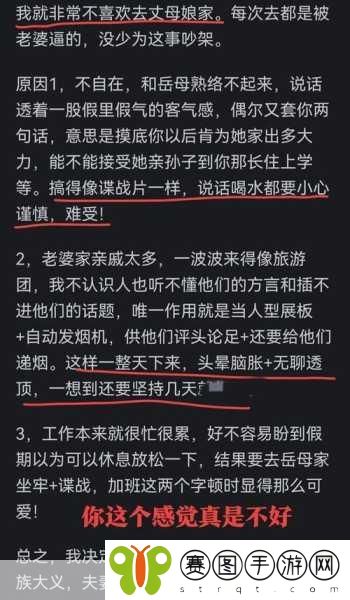女婿称呼的微妙变化
常常可以看到,在家庭聚会或日常生活中,女婿对岳母的称呼出现了一种有趣现象:一会叫“妈”,一会又变成了“阿姨”。这种变化似乎反映出一种亲密与疏离之间的微妙平衡,让人不禁思考其中蕴含的情感和文化意义。
关系阶段与称谓心理
对于许多年轻夫妻而言,婚姻不仅是两个人爱情的一种承诺,同时也意味着两个家庭的结合。刚开始时,由于双方还处在相互熟悉和适应阶段,因此通常更倾向于使用较为正式或者传统化的称呼,比如“阿姨”。这种方式显得礼貌,也能保持一定距离。然而,随着时间推移,两人的关系逐渐升温,当彼此更加亲近后,“妈”这个称谓便自然而然地被采用。这种转变既体现了女婿对岳母的新认同,也是他们之间信任加强的重要标志。

文化背景影响着行为习惯
社会文化环境往往塑造个体间互动模式。在一些地区,更加重视辈分及尊卑秩序,使得年轻人在直面长辈时自然选择保留一定距离。而在另一些地方,人际关系则更为开放、随意,这使得融洽氛围下直接以“妈”来称呼成为可能。不过,不同地域的人们普遍能够理解并接受这一切,只要背后的情感是真诚而流露出来就好。因此,对于家里的长期交往模式以及各方角色扮演都会有所考虑,而这些都深刻影响到一个简单名称所承载的信息量。
用词敏感度与场合差异
言语表达是一门艺术,每个字眼传达出的信息都是经过权衡斟酌之后形成。例如,当一家人围坐一起享受晚餐的时候,用"妈"这类具有亲昵性质的话语,会让气氛更加轻松愉快,相互交流打破隔阂。但是当面对外部访客或者其他非熟识人士,大多数情况下还是会选择更具礼节性的“阿姨”。这样的策略不仅避免了潜在的不适,还帮助维护了良好的社交形象。所以,根据不同场景灵活调整自己的语言,是一种智慧所在,也是增强沟通效果的小技巧之一。

Psycho-emotional dynamics in family interactions
The dynamic between a son-in-law and mother-in-law often encapsulates deeper emotional layers. The shift from "Auntie" to "Mom" can reflect not only comfort levels but also the desire for acceptance within the larger familial structure. For many, calling their partner"s parent “Mom” signifies an embrace of new roles and responsibilities while fostering a sense of belonging within this newly expanded family unit.
Coping with Expectations: Balancing Tradition and Modernity
This duality in addressing one"s mother-in-law might also illustrate broader societal changes regarding gender roles and expectations within families. Traditional norms are increasingly challenged by more egalitarian views on relationships, leading to evolving ways that respect traditional hierarchies yet encourage personal closeness at the same time.
Real-life examples: Navigating through emotions and titles
A few anecdotes highlight how different couples navigate these waters; one couple may find joy in using “Mom,” thereby creating bonds rooted in warmth, whereas another prefers maintaining distance out of respect or habit until they feel ready to make such transitions themselves. In conclusion, every relationship is unique—tied together by shared experiences rather than just mere words used along the journey towards understanding each other deeply as individuals first before title holders.










